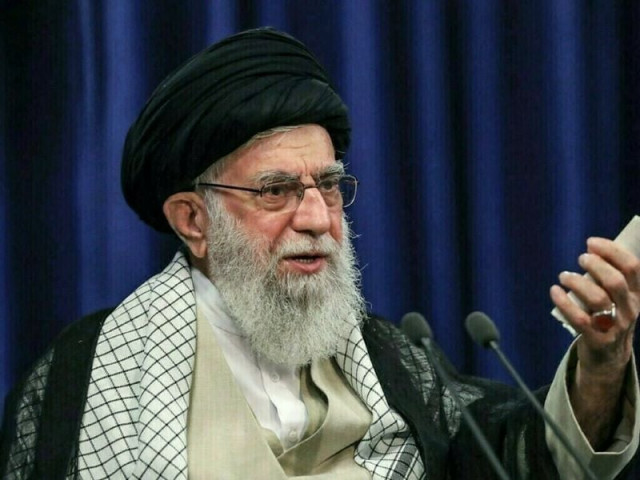Khamenei accuses US, Israel of plotting Bashar al-Assad's downfall
Khamenei said Iranian intelligence warned Syria about stability threats in the past three months

Iran’s Supreme Leader Ayatollah Ali Khamenei has accused the United States and Israel of orchestrating the toppling of former Syrian President Bashar al-Assad, while also blaming a “neighbouring” country of Syria.
“There should be no doubt that what happened in Syria was the result of a joint American-Zionist plot,” said Khamenei, addressing the fall of al-Assad for the first time in a speech delivered in Tehran on Wednesday.
While emphasising that the US and Israel were the main conspirators, Khamenei also alluded to the role played by “a neighbouring state of Syria”, according to state news agency IRNA.
The neighbour had a “clear role and continues to do so,” said Khamenei, without naming the country.
Iraq, Israel, Jordan, Lebanon and Turkiye all share borders with Syria. Of those neighbours, Turkiye has long supported certain Syrian opposition forces.
Khamenei also said that Iranian intelligence had warned the Syrian government about threats to its stability over the past three months, adding that Damascus had “neglected the enemy”.
Blow to ‘axis of resistance’
Syrian rebels’ lightning push to the capital, Damascus, from their strongholds in the northwest ended the decades-long rule of al-Assad’s family.
Iran and Russia had propped up al-Assad’s rule after the eruption of war in 2011 with military and political support, as well as fighters and airpower.
On Tuesday, the commander of Iran’s Islamic Revolutionary Guard Corps, Hossein Salami, said no Iranian forces remained in Syria.
Al-Assad had long played a strategic role in the Iran-led “axis of resistance” against US and Israeli influence in the region, which includes armed groups.
Speaking hours after al-Assad fled Syria on Sunday, US President Joe Biden claimed the end of al-Assad’s rule was partly due to US backing for Israel’s war on Gaza and its fight against Hezbollah in Lebanon, as well as support for groups in Syria and Iraq that weakened Iran.
He also pointed to US support for Ukraine’s war against Russia’s invasion, which siphoned resources from Moscow, and said US forces would remain in northeast Syria.
Israel, meanwhile, has carried out hundreds of air attacks across Syria since the overthrowing of al-Assad, hitting key military sites, while its troops have moved into a demilitarised zone inside Syria, including the Syrian side of the strategic Mount Hermon that overlooks Damascus.
But Khamenei on Wednesday said events in Syria would not diminish Iran’s power, dismissing suggestions that the country would be weakened as “ignorant” and arguing that resistance would grow.
“The more pressure you apply, the stronger it becomes; the more crimes you commit, the more motivated it becomes; the more you fight them, the more expanded it becomes,” he said.
Hours after al-Assad’s fall, Iran said it expected relations with Damascus to continue, based on the two countries’ “far-sighted and wise approach” and called for the establishment of an inclusive government representing all segments of Syrian society.
Iran’s Supreme Leader Ayatollah Ali Khamenei has accused the United States and Israel of orchestrating the downfall of former Syrian President Bashar al-Assad, while also implicating a “neighbouring” country of Syria. In a speech delivered in Tehran on Wednesday, Khamenei said: “There should be no doubt that what happened in Syria was the result of a joint American-Zionist plot.” This marks Khamenei’s first public comments on al-Assad’s fall.
lthough Khamenei emphasised the role of the US and Israel, he also hinted at the involvement of a neighbouring state, which he did not name. According to the state news agency IRNA, Khamenei stated that this neighbouring country had played “a clear role and continues to do so.”
Syria shares borders with several countries, including Iraq, Israel, Jordan, Lebanon, and Turkey. Of these, Turkey has long supported certain Syrian opposition forces, raising speculation about its potential involvement.
Khamenei also claimed that Iranian intelligence had warned Syria about threats to its stability over the past three months, accusing the Syrian government of having “neglected the enemy.”
The fall of al-Assad’s government, which marked the end of decades of rule by his family, came after a Syrian rebel offensive to capture Damascus from their strongholds in the northwest. Iran and Russia had been key backers of al-Assad, providing military and political support as well as fighters and airpower since the outbreak of the civil war in 2011.
On Tuesday, Iran’s Islamic Revolutionary Guard Corps commander, Hossein Salami, declared that no Iranian forces remained in Syria. Al-Assad had long been a key figure in the Iran-led “axis of resistance” against US and Israeli influence in the Middle East, which also includes various armed groups.
US President Joe Biden claimed responsibility for al-Assad’s fall, stating that it was partly due to US support for Israel’s actions in Gaza, the fight against Hezbollah in Lebanon, and assistance to groups in Syria and Iraq that undermined Iranian influence. He also highlighted US support for Ukraine’s war against Russia, which had drained resources from Moscow. Biden added that US forces would remain in northeast Syria.
Israel, for its part, has carried out hundreds of airstrikes across Syria since the toppling of al-Assad, targeting key military sites. Israeli troops have also entered a demilitarised zone in Syria, including the strategic Mount Hermon overlooking Damascus.
However, Khamenei dismissed suggestions that the events in Syria would diminish Iran’s power. Referring to calls for Iran’s weakening as “ignorant,” he insisted that pressure on Iran would only strengthen its resolve. “The more pressure you apply, the stronger it becomes; the more crimes you commit, the more motivated it becomes; the more you fight them, the more expanded it becomes,” he said.
In response to al-Assad’s departure, Iran expressed hope for the continuation of its relations with Damascus, calling for the formation of an inclusive Syrian government representing all segments of society.




1726734110-0/BeFunky-collage-(10)1726734110-0-208x130.webp)














COMMENTS
Comments are moderated and generally will be posted if they are on-topic and not abusive.
For more information, please see our Comments FAQ